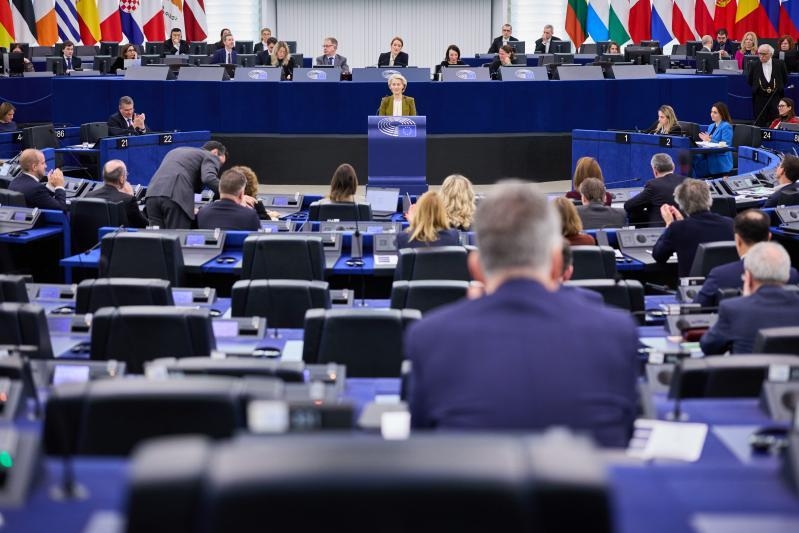
Joint letter – ICC reform and expansion risks diverting ETS Revenues from real climate action
In light of the European Commission’s ongoing considerations to amend the ETS State Aid Guidelines, revising the rules for Indirec...
News

Publish date: December 2, 2024
News
At COP28 last year, world leaders finally called for the beginning of the end of fossil fuels. But where do we stand now?
Bellona has a longstanding presence at the annual Conference of the Parties to the UNFCCC (COP), consistently advocating for ambitious climate action and urging countries to accelerate mitigation efforts. This year, a Bellona delegation attended both weeks in Baku, despite a notable decline in civil society representation. Bellona engaged in ministerial meetings, negotiations, and events, including including co-organising the UNFCCC side event “Is there climate finance for carbon capture and storage, especially in emerging economies?”, speaking at the International Cryosphere Climate Initiative’s event “Creating Space for Nature: Visions of Arctic Futures Aligned with the 1.5°C Emission Reduction Goal”, and moderating Climate Bonds Initiative’s session on “The need for innovative financial instruments, policies, and technologies for the hard-to-abate sectors’ transition.”
While encouraged by progress on carbon markets, Bellona remains deeply concerned about the continued delays in committing to the end of fossil fuels.
«In a world that often feels unstable, the climate summit remains a vital platform for dialogue.»

Frederic Hauge
Founder & General Manager
At COP28, countries globally agreed to “transition away from fossil fuels in energy systems, in a just, orderly and equitable manner, accelerating action in this critical decade, so as to achieve net zero by 2050”. However, these commitments were deferred to the next COP in Brazil. Disappointingly, the COP29 conclusions failed to re-affirm that fossil fuels are the root cause of the climate problem.
Countries also failed to commit to updating their climate targets and plans in line with keeping 1.5 degrees within reach. Meanwhile, the Global Carbon Project has once again shown that the remaining carbon budget needed to stay within the 1.5°C target will likely be exhausted in the coming years.
«A carbon market is only as good as the credibility of its carbon units and its contribution towards overall mitigation efforts, and these remain to be seen. »

Mark Preston Aragonès
Head of Carbon Accounting
International cooperation on mitigation can contribute to higher levels of mitigation efforts, especially in developing countries. The completion of the Paris Agreement’s rulebook for trading of CO₂ reductions and removals bilaterally or through a centralised UN market, is therefore welcome development.; finally obtaining consensus on the rulebook is a major step forward. Nevertheless, in the context of carbon markets, the devil is in the details and the jury is still out on what this particular development means for global climate action.
«There is still plenty of work to be done to fill in the technical details needed to operationalise the Paris Agreement Crediting Mechanism. Despite the increased clarity on rules agreed upon in Baku, the trading of mitigation outcomes also has plenty of potential loopholes and weaknesses.»

Dr. Allanah Paul (on leave)
CDR Research & Technology Senior Advisor
The New Collective Quantified Goal (NCQG) on climate finance was agreed, with parties committing to provide developing nations at least $300 billion annually. Bellona believes developed countries should contribute to funding climate mitigation in developing countries. However, the agreed yet vague $300 billion target will not be enough to cover the full scope of necessary mitigation, adaptation and damages from climate-related catastrophes. Although the new target is lower than the anticipated needs, Bellona recognises this as an important step forward in very challenging negotiations.
«Ambitious climate targets are good, agreeing on climate funding to achieve these is better. Rich countries need to rapidly reduce their own emissions, while providing climate finance to developing countries. »

Olav Øye
Senior Advisor for Climate and Industry
In the next few months, we will know a lot more about the countries’ new climate targets and plans, as they start to submit their Nationally Determined Contributions (NDCs). Bellona urges all countries to honour their commitments to the Paris Agreement and take stronger action to secure an actual path toward a liveable future by submitting ambitious and transparent NDCs which are consistent with 1.5C and transparently clarify the relative contributions of emission reductions and carbon removals.
Read more on Bellona’s previous engagement at COP here.

In light of the European Commission’s ongoing considerations to amend the ETS State Aid Guidelines, revising the rules for Indirec...

“The Commission shall monitor the situation at Union level with a view to monitoring the impact of the CBAM on the Union i...

In this week of industrial discussions, first at the Antwerp Industry Summit on February 12th and then at the informal EU leaders’ mee...

Ahead of the European Commission’s Industrial Accelerator Act proposal on February 25th, Bellona has joined 40 organisations from across indust...

Policy Roundtable Takeaways On December 18th, 2025, Bellona organised a policy roundtable gathering the Swedish construction value chain, public p...
Get our latest news